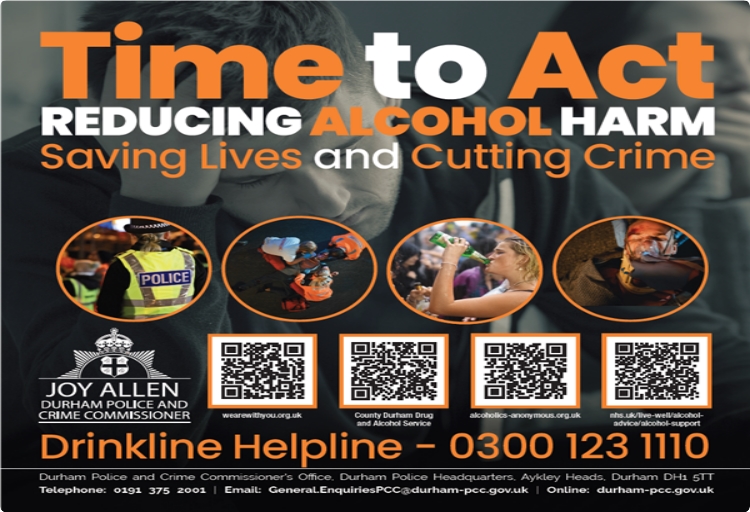
|
||
|
|
||
|
||
|
A message from the Durham Police and Crime Commissioner... Time to Act: Reducing Alcohol Harm, Saving Lives and Cutting Crime. |
||
|
Last week I attended the launch of the latest report from the House of Commons All-Party Parliamentary Group (APPG) Drugs, Alcohol and Justice. Their ‘Action Alcohol Harm’ Report laid bare the true cost of alcohol to our society and set out priorities for decision makers which calls for. Alcohol harm is estimated to cost the NHS £3.5 billion annually, and the wider cost to England’s economy and public services exceeds £21 billion a year. Alcohol places huge pressure on police, NHS staff, ambulance crews, and our communities. It is a factor in up to 40% of police incidents, a third of ambulance callouts and contributes to 39% of violent crime in England. Balance North East estimate that alcohol is costing the North East £1.5 billion a year. From my own experience as your Police and Crime Commissioner for County Durham and Darlington, I see first-hand how alcohol contributes to crime and anti-social behaviour. Whether it’s violent assaults, domestic abuse, criminal damage, or public disorder, alcohol is a common and often overlooked factor. All too often our officers and frontline workers are routinely called deal with the consequences of alcohol-related incidents — often at great personal cost. Yet behind the statistics are real people — many of whom are suffering in silence. We must do more to support those trapped in cycles of addiction, trauma, and offending. As Police and Crime Commissioner, I am clear: we must break the cycle. That means combining enforcement with evidence-led prevention and treatment. That’s why I strongly support the APPG’s call for a long-overdue national alcohol strategy and have already called for this in my Police, Crime and Justice Plan. We need a joined-up approach that brings together policing, health, education, and social care — one that not only treats addiction, but also prevents harm before it occurs. Evidence tells us treatment works. For every £1 invested, alcohol treatment delivers a £3 return in social value over ten years. Recovery services such as Alcoholics Anonymous, which uses a structured 12-step programme, offer people the tools and peer support to rebuild their lives and stay sober long-term. We need to ensure that these services are widely available and properly funded — not just in crisis, but early in the journey. Enforcement must be backed by investment in treatment, rehabilitation, and community recovery services. Punishment alone won’t break the cycle. By treating addiction as a health issue — not just a criminal one — we can reduce reoffending, cut demand on emergency services, and give people a real chance to change. It’s time we faced up to the true scale of alcohol harm — and acted with urgency. A comprehensive national strategy would be a turning point: protecting public health, easing the burden on public services, and reducing crime and anti-social behaviour across our communities. The time to act is now. If you or someone you know is struggling with alcohol, free, confidential help is available:
| ||
Reply to this message | ||
|
|





